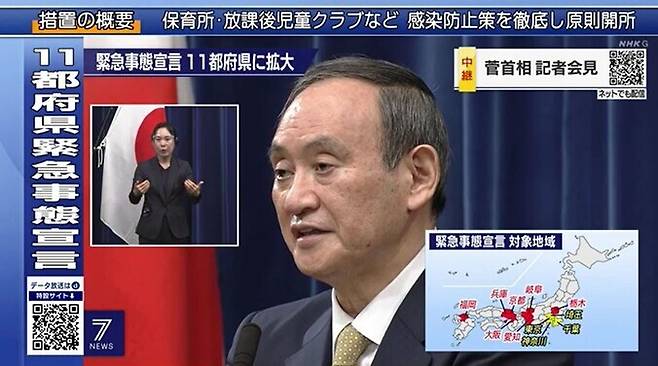Japan bars all foreign nationals from entry, US requires negative test result for all arriving travelers
전체 맥락을 이해하기 위해서는 본문 보기를 권장합니다.
International arrivals by foreign nationals have been suspended completely, including arrivals for business and long-term sojourns, which had previously been allowed for South Korea and 10 other countries and regions. Suga explained, "The discovery of virus variants in people arriving from the UK and Brazil when the domestic situation is already severe has intensified concerns among the Japanese public. Because of this, we have decided to also temporarily suspend arrivals by business travelers."
CDC Director Robert Redfield cautioned, "Testing does not eliminate all risk, but when combined with [. . .] everyday precautions like wearing masks and social distancing, it can make travel safer, healthier, and more responsible by reducing spread [of COVID-19] on planes, in airports, and at destinations."
이 글자크기로 변경됩니다.
(예시) 가장 빠른 뉴스가 있고 다양한 정보, 쌍방향 소통이 숨쉬는 다음뉴스를 만나보세요. 다음뉴스는 국내외 주요이슈와 실시간 속보, 문화생활 및 다양한 분야의 뉴스를 입체적으로 전달하고 있습니다.

Japan and the US are stepping up entry restrictions as the global COVID-19 pandemic escalates and new variants of the virus spread.
Japan has decided to apply its state of emergency declaration to seven additional regions while temporarily barring entry for all foreign nationals. The US plans to require a negative COVID-19 test result from all individuals entering the country.
On the afternoon of Jan. 13, the Japanese government issued additional state of emergency declarations for seven regions, including Osaka. It also announced that it was temporarily suspending international arrivals for business travelers, which had previously been allowed for 11 countries and regions including South Korea and China. The ban is to remain in effect until Feb. 7, when the state of emergency declarations expire.
In a press conference the same afternoon, Prime Minister Yoshihide Suga announced, “We are declaring a state of emergency in seven regions, including Osaka, Aichi, and Fukuoka.” Since the first one declared for Tokyo and three other areas in the capital region, the state of emergency now applies to 11 out of Japan’s 47 prefectures.
International arrivals by foreign nationals have been suspended completely, including arrivals for business and long-term sojourns, which had previously been allowed for South Korea and 10 other countries and regions. Suga explained, “The discovery of virus variants in people arriving from the UK and Brazil when the domestic situation is already severe has intensified concerns among the Japanese public. Because of this, we have decided to also temporarily suspend arrivals by business travelers.”
The measure will prevent foreign nationals from entering Japan. Exceptions will be granted for those attending the funeral of a relative or those with a relative who has recently given birth. The entry ban went into effect at 12 am on Jan. 14, although arrivals will reportedly be permitted through Jan. 21 in cases where visas have already been issued.
The US Centers for Disease Control and Prevention (CDC) announced guidelines on Jan. 12 requiring all international travelers to the US to present proof of a negative COVID-19 test result before boarding as of Jan. 26. Anyone seeking to board a flight bound for the US from anywhere in the world needs to present proof of a negative test result performed within the three days prior to boarding. People who have tested positive within three months of their departure need documentation of a negative test result as well as a letter from a physician clearing them for travel.
People who have been vaccinated against COVID-19 still need proof of a negative result due to the possibility of infection even after inoculation. Airlines will not be allowed to board passengers who do not present the required documents. These measures apply to both US citizens and foreign nationals. Exceptions apply to airline crew members, soldiers, and passengers aged two and below.
CDC Director Robert Redfield cautioned, “Testing does not eliminate all risk, but when combined with [. . .] everyday precautions like wearing masks and social distancing, it can make travel safer, healthier, and more responsible by reducing spread [of COVID-19] on planes, in airports, and at destinations.”
By Kim So-youn, staff reporter, and Hwang Joon-bum, Washington correspondent
Please direct comments or questions to [english@hani.co.kr]
Copyright © 한겨레. 무단전재 및 재배포 금지.
- ‘정인이 양모’ 반박한 법의학자들 “그 통증, 울지도 못할 정도”
- 이언주 ‘악수+15분 연설’…집합금지 위반에 코로나 늑장검사
- ‘동학개미 멘토’ 강방천 “부동산 중심 자산, 흔들리는 계기 될 것”
- 트럼프, 하원서 두번 탄핵된 대통령 됐다
- ‘입주민 갑질' 피해 아파트 경비노동자 첫 산재 인정
- 날고 싶은 정세균의 꿈…친문은 날개를 달아줄까?
- 탈모가 끝이 아니었어…코로나 후유증 ‘딱딱한 폐·피로감’
- 8초만 공개했는데 최고상 받은 LG 롤러블폰, 왜?
- ‘이낙연표 이익공유제’ 대상은 배달의민족·네이버·카카오페이?
- ‘포용’과 ‘여론’ 사이…문 대통령의 ‘사면 방정식’ 해법은?